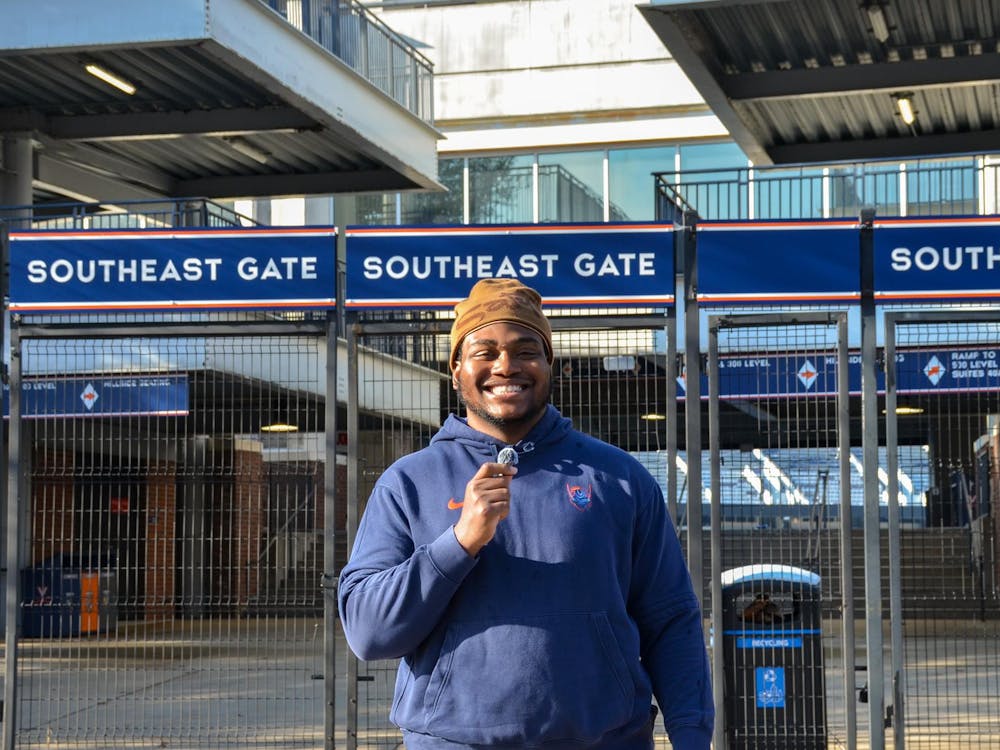The start of another new semester means, among other things, a collective moan from University students about the cost of textbooks. For many students on Grounds, spending $500 or more a semester on books is not uncommon, and with large course loads and seemingly endless book lists, students find themselves having to allocate more and more money toward books each year. While many students are taking advantage of various programs offered by the University Bookstore, others on the same quest for low prices are turning to other vendors.
In an effort to combat high prices, the University Bookstore is offering a myriad of ways for students to save money on textbooks this semester, providing used books, rental textbooks, guaranteed buyback of specific texts and even online versions of textbooks, or e-books.
University Bookstore Executive Director Jon Kates said the bookstore is taking a "multi-prong approach to control the cost of textbooks." He acknowledged that because prices for textbooks are so high, students want other options than simply buying books at publishers' retail prices. One route familiar to students is that of selling textbooks back to the bookstore at the end of semester. This method, however, is usually unprofitable for students.
It's "outrageous," second-year College student Anne Fowler said. "They barely pay you anything when you sell back your old books."
To encourage more students to participate, the bookstore has introduced "guaranteed buyback" of specific texts. Although Kates said the bookstore will buy back "virtually any book if it's in the current edition," he emphasized that guaranteed buyback gives students the "highest rate of return on your investment."
If the bookstore receives confirmation from professors that a text will be used again, it is marked for guaranteed buyback, Kates explained. This ensures students can sell it back to the bookstore at the end of the semester for no less than 50 percent of the original price. Kates also noted that students are allowed to highlight passages and write notes in the book's margins with no penalty.
Another option available to students this semester is that of e-books. According to Kates, this is the second year the bookstore has offered textbooks online, and textbooks for more than 60 courses currently are available online.
Kates said because e-books are about 30 percent cheaper than hardcover books, they are attractive to some students. The University Bookstore Web site states that e-books offer students an advantage because "you have the ability to search the entire text for a word or phrase, add comments, create your own bookmarks, and print on-demand all from your personal computer or laptop."
Though the idea of e-books may be attractive, Kates said historically students have not been very interested. He described the number of students participating in the usage of e-books as "very minuscule."
A number of students seem to prefer hardcover books rather than digital versions.
"There is no substitute for having that text right in front of you," second-year College student Joshua Carter said. "There is something about that tangible nature that I am more comfortable with."
Second-year College student Cara Koplen also said she does not enjoy using textbooks online.
"E-books are annoying, in my opinion," Koplen explained. "I like having pages in front of me that I can highlight, underline and flip, rather than scroll, through."
Despite this, Kates noted that the industry is evolving, and bookstore employees hopes that as technology improves, the use of e-books will rise.
First-year College student Lynne Kolodinsky said she would consider using e-books in the future.
"I generally prefer to do as much of my work on the computer as possible," she said. "It would also be much more convenient than carrying heavy books all around Grounds."
In contrast, an offering that Kates said has generated much interest among students this semester is rental textbooks. Students rent texts at the beginning of the semester and are simply responsible for returning them to the bookstore at the end of the semester, Kates explained. They must return the book without visible damages or they will be charged the difference between the rental cost and full price of the book.
This is the second semester rental books have been offered by the University, and Kates said the response has been "absolutely remarkable." Working with faculty, the bookstore has been able to offer rental texts for as little as 40 percent of full retail value, according to Kates.
Kolodinksy, who rented her environmental science textbook this semester, said she was able to save more than $65, and Carter said he felt he had saved "a substantial amount money through renting textbooks."
Though the rental program prevents students from highlighting or writing notes in the margins, Kolodinsky said this policy does not really bother her, as she takes almost all of her notes on a computer anyway. Carter also said his text was not thoroughly examined when he returned it, suggesting that the bookstore may have a relaxed approach toward this policy. Additionally, not all titles are offered as rentals.
"Unfortunately, for people like me who are more humanities-oriented, the bookstore mostly seems to offer textbooks [for rent, as opposed to novels]," said Fowler.
Despite the bookstore's efforts to offer a wide range of options to students, many still view prices at the bookstore as high.
"It's frustrating," second-year College student Emily Rowell said. "I feel like I never get a good deal at the bookstore."
Economics Department Chair Bruce Reynolds noted that one reason why the bookstore may be expensive is because it is not subsidized and has to cover costs that other sellers don't.
"Therefore, it's not surprising that prices are high," he said, adding, "I think it's appropriate for students to get books where they can find them the most cheaply."
Many students agree with this idea and are turning to online retailers to purchase textbooks.
"This semester I bought a few of my books from amazon.com, which ended up saving me about $30 total," Fowler said.
Fourth-year College student John Morrison said he uses a Web site known as Alibris.
"They have almost any book you'll need to find," he said. "I have yet to get a bad book."
Another option students commonly employ is buying from fellow students.
"I think student-to-student is the cheapest way to buy and sell," said Fowler, who has used this method in the past.
With a range of textbook vendors available, students such as Kolodinsky and Carter are finding it possible to save money on textbooks this semester. As he finalizes his schedule for the semester, Carter said he will consider the various ways to save money on textbooks.
"It's great to know I have options!" he said.






